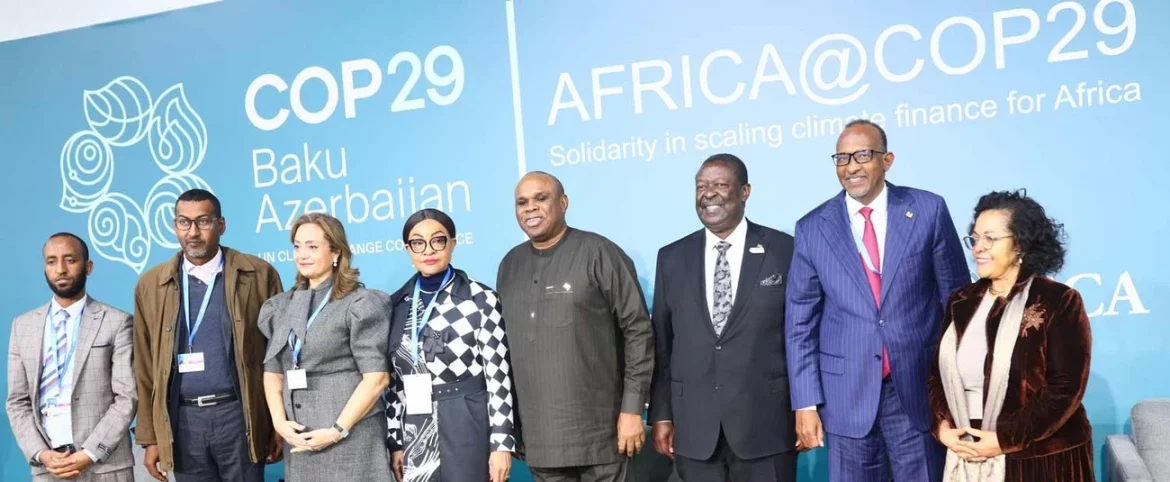At the 29th United Nations Climate Change Conference (COP29) in Baku, Azerbaijan.., leaders from across the African continent have made a compelling call for action to the international community, demanding an Increase in Climate Finance that will contribute to climate adaptation and the move to embrace Green Growth.
Although Africa contributes less than 4% of global greenhouse gas emissions, it bears a disproportionate load of the climate crisis. At the same time, the continent receives just 3 to 4% of global climate finance, although it is home to nine of the ten countries that are most vulnerable to climate change. Kariuki stated that the aim is to increase this to 10% by 2030.
The leaders made the call at a high-level session entitled “Increasing finance for adaptation to climate change and green growth in Africa,” jointly hosted by the African Union Commission, the African Development Bank Group, the UN Economic Commission for Africa (UNECA), and the African Union Development Agency’s New Partnership for Africa’s Development (AUDA-NEPAD) as part of Africa Day.
“We hope to move from millions and billions (of dollars) to the thousands of billions of dollars Africa clearly needs for climate action,”said Kevin Kariuki, Vice President of the African Development Bank Group for Power, Energy, Climate and Green Growth. “The success of this COP, described as the “finance COP,” will largely depend on the level of ambition of the climate finance target,”.
Africa Day serves as a platform for African Heads of State and Government, leaders of regional institutions, ministers, researchers, leaders in the private sector and financial institutions, civil society organizations, development partners, and other stakeholders to address shared challenges, reaffirm Africa’s priorities during the annual global climate conference. It also allows the continent’s leaders to deliberate and propose ways forward on critical issues relating to climate change and other development challenges.
Read also: Cop29 delegates say China, India should not be called developing countries
Benedict Oramah, President of Afreximbank, emphasized the urgency of the situation, noting that Africa is losing an average of 5 percent of its GDP due to climate challenges. “Climate change in Africa is an existential question that needs immediate action,” he said, emphasizing that inaction risked causing even greater loss and damage and calling for accountability: “Waiting for climate deniers to pay voluntarily for the damage they have caused is a little like Nero fiddling while Rome burned.”
Oramah called for immediate action on mobilizing the $700 million committed to the Loss and Damage Fund and innovative financing mechanisms such as climate insurance financed by developed countries.
“We are victims of a climate crisis for which we are not responsible (…) We refuse to ask for loans for problems we have not caused,” stated Mithika Mwenda, Executive Director of the Pan African Climate Justice Alliance (PACJA). “It is essential that climate finance is based on grants and that they are appropriate to the needs of our communities in Africa.”
The African Development Bank estimates that African countries need $277 billion annually until 2030 to tackle the climate crisis effectively. Currently, they receive just $30 billion a year.
UNECA Executive Secretary Claver Gatetewarned that climate devastation costs Africa 5 percent of its GDP annually. He outlined five priorities: harnessing critical minerals to move towards a resilient future; increasing carbon capture in areas like the Congo Basin; securing an estimated $1.3 billion annual funding for the Sustainable Development Goals; accelerating clean energy transition with Africa as a potential hub; and taking collective action to reduce greenhouse gas emissions”.
Musalia Mudavadi, Prime Cabinet Secretary, representing Kenyan President William Ruto, called on world leaders to fulfill their promise of $100 billion a year, announced in 2009. “It is essential that this time, words are translated into concrete actions.”
He expressed concern that climate funding was declining instead of reaching its planned doubling by 2025. “This shortfall is compromising the achievement of the Sustainable Development Goals, undermining the investments already made in resilience and threatening the aspirations set out in the African Union’s Agenda 2063,” he warned.
Josefa Sacko, Commissioner for Agriculture, Rural Development, the Blue Economy and Sustainable Environment at the African Union Commission, emphasized the urgency of climate finance accessibility. She stressed that African nations need better access to adaptation funding by the COP’s end, highlighting adaptation as a key priority.
Many speakers emphasized that early warning systems are crucial for Africa’s climate adaptation, helping to prevent both immediate destruction and long-term vulnerabilities. The African Ministerial Conference on Meteorology has recognized these systems as key to shifting from crisis management to risk prevention across agricultural and urban areas.
Anthony Nyong, Director of Climate Change and Green Growth at the African Development Bank, highlighted the Bank’s climate finance growth from 9 percent of its total investments in 2016 to 45 percent in 2023. He noted that while Africa’s investments are often labeled “high risk,” this largely stems from risk perception rather than reality. The Bank addresses this through guarantees and initiatives like the African Financial Alliance on Climate Change.
Story was adapted from AFDB.
